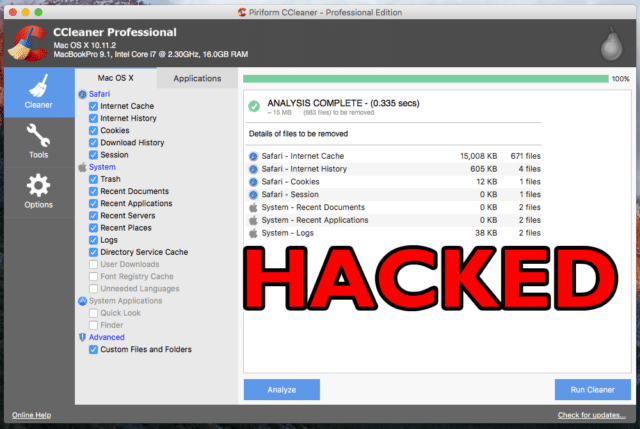The CCleaner Hack is blowing up, with it initially estimated to be huge, it’s hit at least 700,000 computers and is specifically targeting 20 top tech organisations including Cisco, Intel, Microsoft, Akamai, Samsung and more for a second, more intrusive and pervasive layer of infection.

This could be classified as slightly ironic too as CCleaner is extremely popular software for removing crapware from computers, it was a clever assumption that a corrupt version would find itself installed in some very high-value networks.
Hackers have successfully breached CCleaner’s security to inject malware into the app and distribute it to millions of users. Security researchers at Cisco Talos discovered that download servers used by Avast (the company that owns CCleaner) were compromised to distribute malware inside CCleaner. “For a period of time, the legitimate signed version of CCleaner 5.33 being distributed by Avast also contained a multi-stage malware payload that rode on top of the installation of CCleaner,” says the Talos team.
CCleaner has been downloaded more than 2 billion times according to Avast, making it a popular target for hackers. Dubbed “crap cleaner,” it’s designed to wipe out cookies and offer some web privacy protections. 2.27 million users have been affected by the attack, and Avast Piriform believes it was able to prevent the breach harming customers. “Piriform believes that these users are safe now as its investigation indicates it was able to disarm the threat before it was able to do any harm,” says an Avast spokesperson.
Source: The Verge
This CCleaner Hack is a fairly advanced attack with some people making links to the Chinese government, an attack of this scale and focus does feel like a nation-state attack. There is some code reuse from the Group 72 also known as Axiom who are linked to the Chinese Government.
Some of the configuration files are also set in China’s time zone, which whilst it does indicate it probably is from China – it doesn’t link it for certain to the government.
Earlier this week, security firms Morphisec and Cisco revealed that CCleaner, a piece of security software distributed by Czech company Avast, had been hijacked by hackers and loaded with a backdoor that evaded the company’s security checks. It wound up installed on more than 700,000 computers. On Wednesday, researchers at Cisco’s Talos security division revealed that they’ve now analyzed the hackers’ “command-and-control” server to which those malicious versions of CCleaner connected.
On that server, they found evidence that the hackers had attempted to filter their collection of backdoored victim machines to find computers inside the networks of 20 tech firms, including Intel, Google, Microsoft, Akamai, Samsung, Sony, VMware, HTC, Linksys, D-Link and Cisco itself. In about half of those cases, says Talos research manager Craig Williams, the hackers successfully found a machine they’d compromised within the company’s network, and used their backdoor to infect it with another piece of malware intended to serve as a deeper foothold, one that Cisco now believes was likely intended for industrial espionage.
Source: Wired
And as a user, it means you should be careful. It seems the malicious version in this CCleaner hacking seems to have dug in pretty deep, even more so if it was installed inside one of the ‘target’ networks as the second piece of more intrusive malware was pushed in.
Avast is recommended computers be restored from backups taken before to the compromise happened.
It doesn’t appear to be ransomware at this point, hopefully, some more details will emerge, but it’s most likely a more insidious attack like NotPetya.
